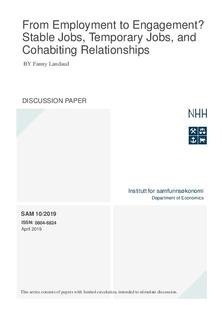| dc.contributor.author | Landaud, Fanny | |
| dc.date.accessioned | 2019-05-02T10:51:46Z | |
| dc.date.available | 2019-05-02T10:51:46Z | |
| dc.date.issued | 2019-04 | |
| dc.identifier.issn | 0804-6824 | |
| dc.identifier.uri | http://hdl.handle.net/11250/2596301 | |
| dc.description.abstract | Family formation has been substantially delayed in recent decades, and birth rates have fallen below the replacement rates in many OECD countries. Research suggests that these trends are tightly linked to recent changes in the labor market; however, little is know about the role played by increases in job insecurity. In this paper, we investigate to what extent the decline in the share of permanent jobs among young workers explains observed delays in age at first cohabitation and age at first child. Using French data on the work and family history of large samples of young adults, we provide evidence that access to permanent jobs has a much stronger effect than access to temporary jobs on the probability of entering a first cohabiting relationship as well as on the probability of having a first child. We find that about half of the increases in age at first cohabitation and at first child can be explained by the rise in unemployment and in the share of temporary jobs among young workers. | nb_NO |
| dc.language.iso | eng | nb_NO |
| dc.relation.ispartofseries | DP SAM;10/2019 | |
| dc.title | From Employment to Engagement? Stable Jobs, Temporary Jobs, and Cohabiting Relationships | nb_NO |
| dc.type | Working paper | nb_NO |
| dc.subject.nsi | Samfunnsvitenskap | nb_NO |
| dc.source.pagenumber | 38 | nb_NO |
